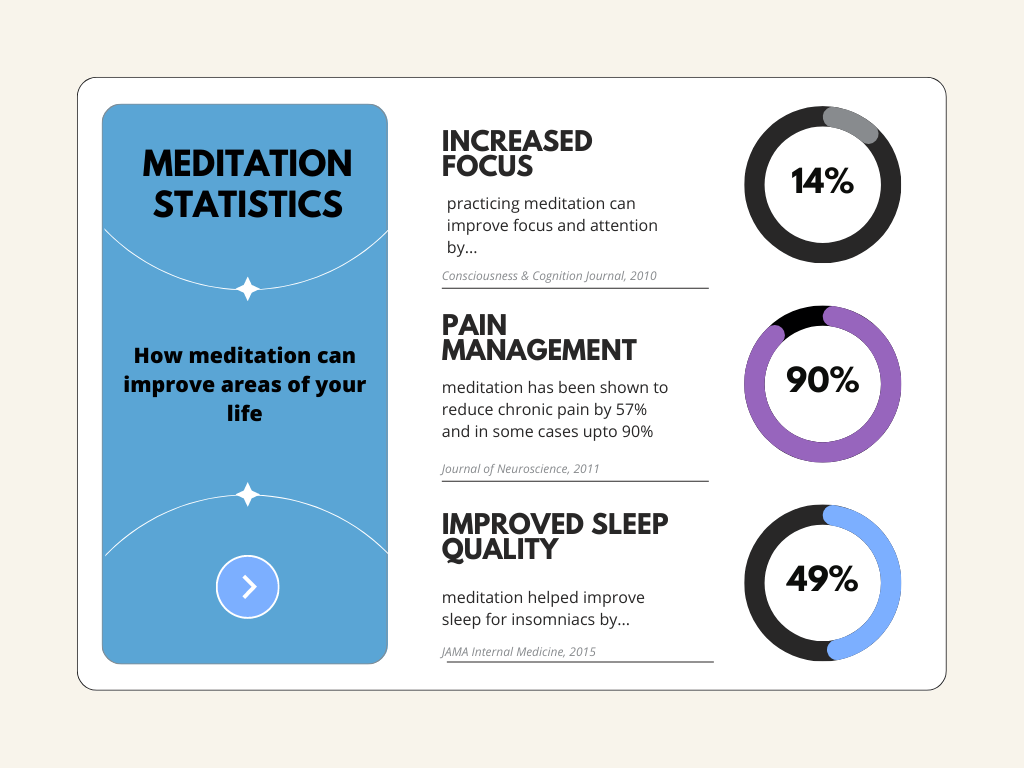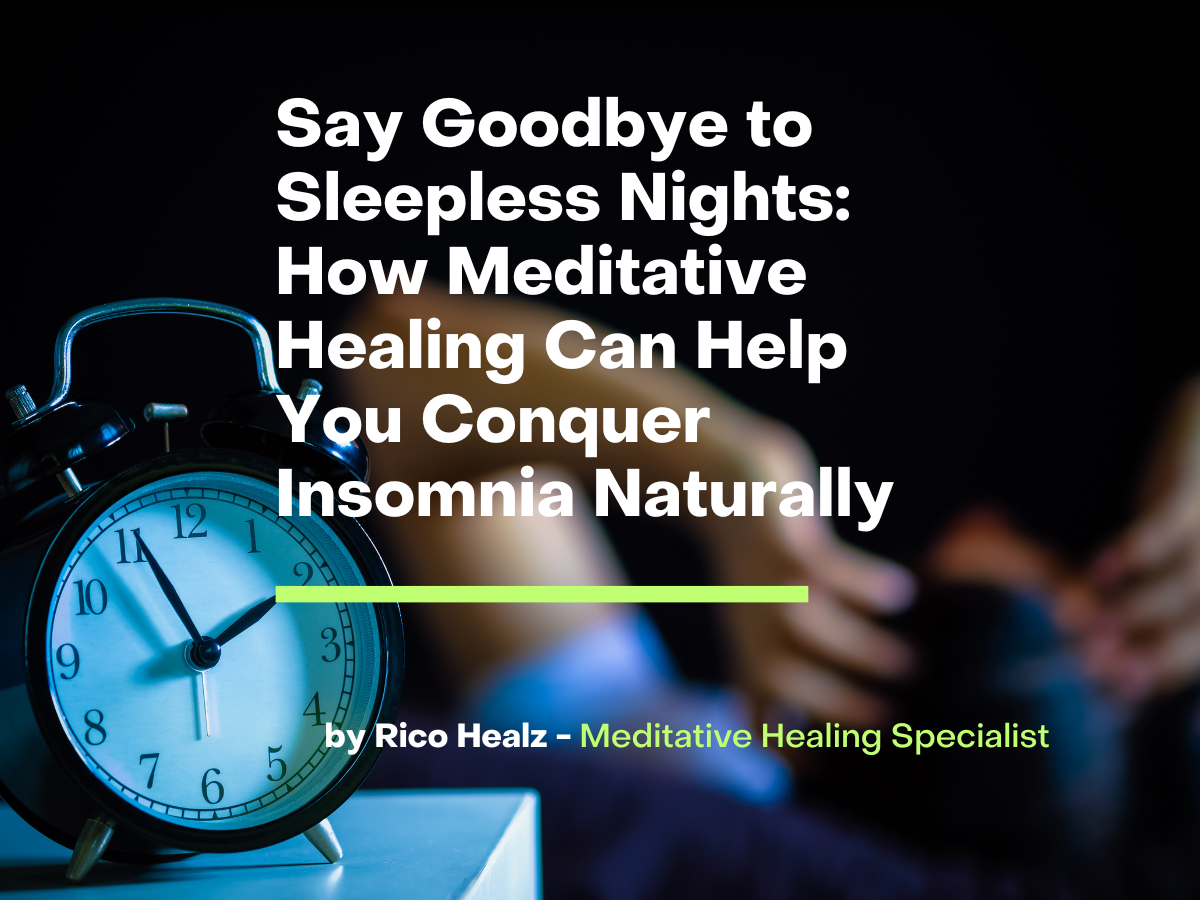Insomnia No More: Meditative Healing to the Rescue!
Introduction
Are you tired of tossing and turning in bed each night, struggling to find the restful sleep your body and mind crave? Insomnia is a common issue that plagues millions of people worldwide, impacting their daily lives and overall well-being. The good news is that there is a natural and powerful solution to this sleepless plight – “Insomnia No More: Meditative Healing to the Rescue!”
Insomnia, characterized by difficulty falling asleep, staying asleep, or waking up too early, can lead to various problems, including daytime fatigue, irritability, and difficulty concentrating. In our fast-paced, technology-driven world, the prevalence of insomnia has only grown, making it increasingly important to find effective ways to combat this sleep disorder.
Enter meditative healing, an ancient practice that has been used for centuries to promote relaxation, balance, and inner peace. This time-tested technique has recently gained recognition as a powerful tool in the battle against insomnia. Through meditation, individuals can learn to calm their minds, release tension, and ultimately, improve their sleep quality. In this blog article, we will explore the science behind meditation’s impact on sleep, various meditative practices that can aid in restful slumber, and practical tips to integrate meditation into your sleep routine. So, let’s embark on a journey towards “Insomnia No More: Meditative Healing to the Rescue!” and discover the restorative power of this transformative practice.
1. Understanding the Root Causes of Insomnia
Before diving into the world of meditative healing for better sleep, it’s essential to understand the root causes of insomnia. By identifying the factors contributing to your sleepless nights, you can more effectively address them with meditation and other sleep-improving strategies.
Stress and anxiety
One of the most common causes of insomnia is stress and anxiety. Worrying about work, relationships, health, or other life events can keep your mind racing, making it difficult to relax and fall asleep. Meditation helps calm the mind and reduce stress, making it an effective tool for combating anxiety-induced insomnia.
Unhealthy sleep habits
Poor sleep habits can significantly impact your ability to get a good night’s rest. These habits may include irregular sleep schedules, consuming stimulants like caffeine or nicotine close to bedtime, and engaging in stimulating activities before sleep, such as watching TV or using electronic devices. Incorporating meditation into a healthy sleep routine can help retrain your body and mind for better sleep.
Physical health issues
Certain physical health issues, like chronic pain or sleep apnea, can contribute to insomnia. While meditation may not directly address these underlying conditions, it can help manage the discomfort or anxiety associated with them, improving sleep quality.
Mental health disorders
Mental health disorders, such as depression, bipolar disorder, or post-traumatic stress disorder (PTSD), can also lead to sleep disturbances. Incorporating meditation into a comprehensive treatment plan can help alleviate some of the symptoms of these disorders, potentially improving sleep as a result.
Lifestyle factors
Finally, various lifestyle factors can contribute to insomnia, such as shift work, jet lag, or a lack of physical activity. While meditation may not directly change these factors, it can help you develop greater resilience and adaptability to these sleep-disrupting circumstances.
Understanding the root causes of your insomnia is the first step toward finding relief. As you explore meditative healing as a potential solution, remember that addressing these underlying factors will be crucial to achieving lasting improvements in your sleep.

2. The Science of Meditation and Sleep: Statistical Insights
As you consider incorporating meditative healing into your sleep routine, it’s helpful to understand the scientific research and statistical data that support meditation’s effects on sleep. This growing body of evidence provides insight into how meditation can improve sleep quality and duration.
Research on meditation’s effects on sleep
A study published in JAMA Internal Medicine in 2015 found that mindfulness meditation helped improve sleep quality for adults with moderate sleep disturbances. The participants who practiced mindfulness meditation experienced a significant reduction in their insomnia severity index score, with a decrease of 5.06 points compared to a 1.09-point reduction in the control group.
Another study conducted in 2012 revealed that a 6-week meditation intervention led to a 42% decrease in insomnia symptoms, a 30% decrease in depression symptoms, and a 25% reduction in fatigue levels among participants.
Research has also shown that meditation can increase total sleep time. A study published in Sleep Medicine in 2019 found that an 8-week mindfulness-based stress reduction program increased participants’ total sleep time by an average of 36 minutes per night.
Understanding the relaxation response
The relaxation response is a physiological state characterized by decreased heart rate, blood pressure, and muscle tension, promoting a sense of calm and well-being. A study published in Psychoneuroendocrinology in 2013 found that participants who practiced relaxation response techniques, such as meditation, experienced a 44% reduction in their overall use of healthcare services.
During meditation, the relaxation response is triggered, leading to a shift in the body’s stress response and promoting a state of deep relaxation. This relaxed state can counteract the negative effects of stress on sleep, making it easier to fall asleep and stay asleep throughout the night.
By exploring the science and statistical data behind meditation and sleep, you can better understand how this ancient practice can help you achieve restorative, restful sleep and ultimately improve your overall well-being.

3. Types of Meditative Practices for Better Sleep
With various meditative practices available, you can choose the one that best suits your needs and preferences. Here are five popular types of meditation that have been found to be particularly effective in promoting better sleep:
Mindfulness meditation
Mindfulness meditation involves focusing your attention on the present moment while calmly acknowledging and accepting your thoughts, feelings, and bodily sensations. This practice can help quiet a racing mind, making it easier to drift off to sleep. It can also help you become more aware of your body’s signals, allowing you to recognize when you’re ready for rest.
Body scan meditation
Body scan meditation involves mentally scanning your body from head to toe, paying attention to any areas of tension or discomfort. This practice encourages deep relaxation by helping you release tension and become more aware of your body’s sensations. By focusing on relaxing each part of your body, you can create an overall sense of calm that can ease you into sleep.
Guided imagery meditation
Guided imagery meditation involves using your imagination to visualize peaceful, calming scenes or experiences. This practice can help distract you from stressful thoughts or worries that might be keeping you awake. By focusing on serene images, you can enter a relaxed state that promotes sleep.
Yoga Nidra
Yoga Nidra, also known as “yogic sleep,” is a guided meditation practice that takes you through various stages of relaxation, leading to a deeply restorative state of consciousness between wakefulness and sleep. This practice can help you release tension, calm your nervous system, and encourage a restful night’s sleep.
Loving-kindness meditation
Loving-kindness meditation, or Metta meditation, involves cultivating feelings of love, compassion, and goodwill towards yourself and others. This practice can help to reduce negative emotions, such as anger or resentment, which may contribute to sleep disturbances. By fostering a sense of well-being and inner peace, loving-kindness meditation can create a more conducive environment for sleep.
Experiment with these different meditation techniques to discover which one resonates best with you. Incorporating the right meditation practice into your daily routine can have a profound impact on your sleep quality and overall well-being.

4. Tips for Incorporating Meditation into Your Sleep Routine
To fully experience the benefits of meditation for better sleep, it’s essential to integrate this practice into your daily routine. Here are some practical tips for incorporating meditation into your sleep routine, ensuring you’re setting yourself up for success:
Setting up a dedicated meditation space
Create a comfortable and quiet space in your home where you can practice meditation without distractions. This could be a dedicated meditation room or a cozy corner with a comfortable chair or cushion. Having a designated space can help signal to your mind that it’s time to relax and meditate.
Establishing a consistent schedule
Consistency is key when it comes to meditation. Try to practice at the same time each day, ideally in the evening before bedtime, to help your body and mind associate meditation with relaxation and sleep. Start with just a few minutes per day and gradually increase the duration as you become more comfortable with the practice.
Choosing the right meditation technique for you
As mentioned earlier, there are several meditation techniques that can help improve sleep. Experiment with different methods to find the one that resonates best with you. Remember, there’s no one-size-fits-all approach to meditation, so be patient with yourself as you explore different practices.
Utilizing technology and resources
There are numerous resources available to support your meditation practice, including apps, online classes, and guided sessions. Some popular meditation apps, such as Headspace, Calm, and Insight Timer, offer guided meditations specifically designed for sleep. These resources can provide you with expert guidance and help you stay consistent in your practice.
By implementing these tips and making meditation a regular part of your sleep routine, you’ll be well on your way to experiencing the restorative benefits of meditative healing and enjoying restful, rejuvenating sleep.

5. Combining Meditation with Other Sleep-Improving Strategies
While meditation can significantly improve your sleep, combining it with other sleep-improving strategies can further enhance your rest and overall well-being. Consider incorporating these additional tactics alongside your meditation practice to maximize the benefits:
Creating a bedtime routine
Establishing a consistent bedtime routine can signal to your body and mind that it’s time to wind down and prepare for sleep. In addition to meditation, consider incorporating other relaxing activities into your routine, such as reading, taking a warm bath, or practicing gentle stretches.
Regulating exposure to screens and blue light
Exposure to screens and blue light emitted from electronic devices can interfere with your body’s production of melatonin, the hormone responsible for regulating sleep. Limit your screen time in the evening and consider using blue light-blocking glasses or apps to reduce the impact of blue light on your sleep.
Incorporating physical activity and exercise
Regular physical activity can help improve sleep quality by reducing stress and promoting overall well-being. Aim for at least 150 minutes of moderate-intensity aerobic exercise or 75 minutes of vigorous-intensity aerobic exercise per week, along with muscle-strengthening activities on two or more days per week.
Improving sleep hygiene
Creating an optimal sleep environment and practicing good sleep hygiene can greatly impact your ability to fall asleep and stay asleep. Consider the following tips for better sleep hygiene:
- Optimal bedroom environment: Keep your bedroom cool, dark, and quiet to create a conducive environment for sleep. Invest in blackout curtains or a sleep mask to block out light, and use a white noise machine or earplugs to minimize noise.
- Comfortable sleep gear: Ensure that your mattress, pillows, and bedding are comfortable and supportive. Replace your mattress and pillows as needed, typically every 7-10 years for mattresses and every 1-2 years for pillows.
By combining meditation with these additional sleep-improving strategies, you can create a comprehensive approach to overcoming insomnia and enjoying a better night’s rest.

6. Real-Life Success Stories: Transforming Sleep Through Meditation
Meditation has proven to be an effective tool for countless individuals seeking to improve their sleep and overall well-being. Let’s take a look at some real-life success stories of people who have transformed their sleep patterns and lives through the power of meditation:
Sarah’s journey to better sleep
Sarah, a 35-year-old working professional, struggled with insomnia for years. Her busy work schedule and high-stress job left her tossing and turning at night, unable to find restorative sleep. After discovering mindfulness meditation, Sarah began a regular practice of meditating for 20 minutes each evening before bed. Within just a few weeks, she noticed a significant improvement in her ability to fall asleep and stay asleep. Sarah credits meditation with helping her develop a healthier relationship with sleep, allowing her to wake up feeling refreshed and ready to tackle her day.
Mark’s transformation through Yoga Nidra
Mark, a 42-year-old father of two, experienced frequent sleep disturbances due to a high-pressure job and the demands of parenthood. Searching for a solution, he discovered Yoga Nidra, a guided meditation practice designed to induce deep relaxation. By practicing Yoga Nidra each night, Mark was able to let go of stress and anxiety, making it easier for him to drift off to sleep. Not only did his sleep quality improve, but he also found that his overall stress levels decreased, leading to better work performance and a more balanced home life.
Emily’s journey to conquer anxiety and insomnia
Emily, a 28-year-old graduate student, battled with anxiety-induced insomnia for years. Desperate for a solution, she began practicing loving-kindness meditation (Metta meditation) each night before bed. This practice helped Emily cultivate feelings of compassion and love for herself and others, gradually reducing her anxiety levels. As her anxiety lessened, her sleep improved, and she found herself waking up feeling more energized and focused during the day.
These real-life success stories demonstrate the transformative power of meditation for improving sleep quality and overall well-being. By incorporating meditation into your daily routine, you too can experience the benefits of restorative sleep and a more balanced, fulfilling life.

Conclusion
Overcoming insomnia and achieving restorative sleep is possible through the power of meditative healing. By understanding the science behind meditation and sleep, exploring various meditation techniques, and incorporating these practices into your daily routine, you can experience significant improvements in your sleep quality and overall well-being.
Combining meditation with other sleep-improving strategies can further enhance your rest, leading to a healthier, more balanced life. As real-life success stories have shown, meditation has the potential to transform not only your sleep but also your overall quality of life. So, embark on your journey towards “Insomnia No More: Meditative Healing to the Rescue!” and discover the life-changing benefits of a restful night’s sleep.


Meu irmão recomendou que eu pudesse gostar deste site Ele estava totalmente certo Este post realmente fez o meu dia Você não pode imaginar quanto tempo gastei com esta informação Obrigado
Site maravilhoso Muitas informações úteis aqui Estou enviando para alguns amigos e também compartilhando deliciosos E obviamente graças ao seu esforço
Obrigado, recentemente estive procurando informações sobre este assunto há algum tempo e a sua é a maior que descobri até agora. Mas e em relação aos resultados financeiros Você tem certeza em relação ao fornecimento
Eu li algumas coisas excelentes aqui Definitivamente vale a pena marcar como favorito para revisitar Eu me pergunto quanto esforço você fez para fazer esse tipo de site informativo excelente
I do trust all the ideas youve presented in your post They are really convincing and will definitely work Nonetheless the posts are too short for newbies May just you please lengthen them a bit from next time Thank you for the post
Nice blog here Also your site loads up very fast What host are you using Can I get your affiliate link to your host I wish my site loaded up as quickly as yours lol.
It is quite enjoyable for me to read through a piece that can provoke thought in both men and women. Please accept my gratitude for allowing me to leave a comment.